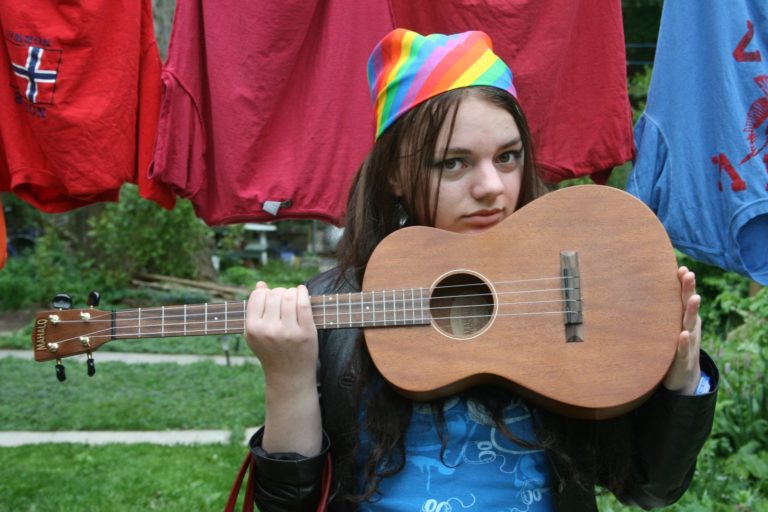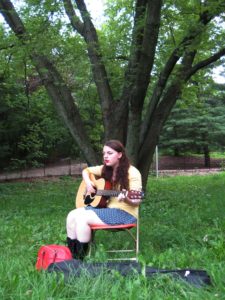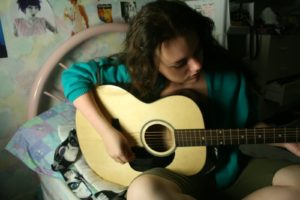
I have a classically millennial problem, which is that I keep monetizing all my hobbies, thereby draining a lot of the joy out of them. I’m sure many of you can relate.
Professionalizing what was once a creative diversion isn’t inherently a bad thing – I love writing and am happy almost every day that I get to make a living doing something I enjoy and am good at. I just think it’s a mistake to turn all your hobbies into income sources (keeping in mind that being able to avoid this is, of course, a function of financial privilege and is not an option for everyone). It’s much, much easier to get burned out on your work when you have very few non-work avenues for creativity, playfulness, exploration, and growth.
One way I’ve tried to combat this problem in my life is to create a protocol with my partner that “forces” me to make music more consistently. See, when I was younger, music was my life. I sang in choirs from a young age, studied violin and ukulele in school, took piano lessons, guitar lessons, voice lessons, auditioned for musicals, performed in revues, played shows at coffee shops, busked in parks, opened for local musicians, laid down tracks in recording studios, tickled the ivories at theatre festivals. There was a period of time when I very seriously planned to play music for a living. (You can watch me playing songs dating back to ~2005 on my YouTube channel if you want.)

Writing my own songs and performing them, in particular, nourished my soul. In high school I would write as many as 8 new songs a month, many of which were actually pretty good. (Here’s a collection of some of my favorites if you want to take a listen.) There was something deeply satisfying about crystallizing a particular emotion or experience into a sonically appealing piece of art, and then being able to play it for people. Even on my saddest nights, after breakups or rejections or awkward parties, I could cobble together a song from my tears and wounds and failures, and it would make me feel better without fail.
However, then I went on hormonal birth control, and what followed was a period of three and a half years when I was wracked with mental health symptoms worse than any I’d previously experienced – plus, notably, a total loss of my creative drive. I wrote zero songs for years, and it hurt. I’d sit at the piano, or hold my ukulele protectively against my chest, willing new music to occur to me magically and near-effortlessly the way it once had – but my songwriting impulse was totally gone.
Upon going off the NuvaRing, I hesitantly wrote my first song in years – called “Anxiety,” since that was my main emotion at the time – and more songs started to come after that. But the writing process was slow, stilted, forced. I rarely seemed able to recapture the frenetic energy that had propelled me to write literally dozens of songs a year, way back when.
Anyway, back to the present, and the protocol. I told my spouse a while ago that I really missed playing and singing – that I felt I’d lost part of myself when I’d lost the music. I’d moved out of my parents’ big old house, with its big old piano, and into a small apartment where my roommate and neighbors could hear every note I played. I was paralyzed by self-doubt, worried that my voice was rusty and so was my musicality in general. So with my permission, mb made a protocol dictating that every month, I would have to learn (or write) one new song, and make an audio or video recording of myself playing it.

It may seem counterintuitive to try to “force” yourself to do something that is “supposed” to be about joy, freedom, play. But sometimes it works. I still only play music once or twice a month, which pales in comparison to my high school days when I’d play almost every night – but that’s better than nothing.
Over the past several months, at mb’s behest, I’ve covered a ton of songs I admire and love: “Jeremy’s Wedding” and “Where Are You, Judy?” by Andy Shauf, “Vines” by Hippo Campus, “Alone Again, Naturally” by Gilbert O’Sullivan, “Saw You in a Dream” by the Japanese House, “Brooklyn” by Brotherkenzie, “Harvey” by Her’s, and “Girlfriend” by Daniel Bedingfield. Playing other people’s songs isn’t quite the same creative rush as setting my own words to my own melodies, but it nonetheless feels like a breath of fresh air after so many years of keeping my music at a distance emotionally, like a lover you’re about to break up with. I’m tiptoeing my way back into what used to be my greatest joy, and it may not feel exactly the way it used to, but nothing really does. That’s the nature of aging.
In adulthood, sometimes we have to schedule our recreation, plan our playfulness, put our aimless meandering on a calendar – or it simply won’t happen. This protocol has taught me that prioritizing my own creative expression (OUTSIDE OF WORK, crucially) is imperative for my happiness, and is an extremely basic act of self-care. I may not be able to become that starry-eyed, ukulele-wielding teenager I once was, but when I make music, I can almost touch her again, can almost hear her. And it sounds like she’s telling me to sing louder.